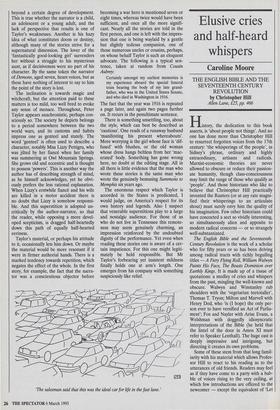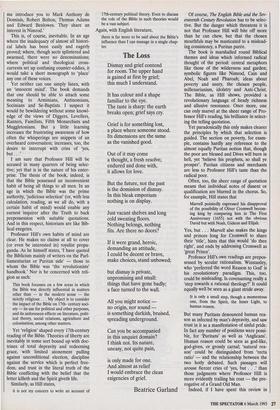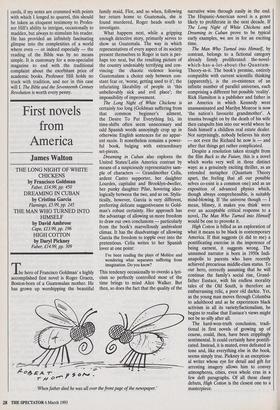Elusive cries and half-heard whispers
Caroline Moore
THE ENGLISH BIBLE AND THE SEVENTEENTH CENTURY REVOLUTION by Christopher Hill Allen Lane, £25, pp. 466 History, the dedication to this book asserts, is 'about people not things'. And no one has done more than Christopher Hill to resurrect forgotten voices from the 17th centuty: 'the whisperings of the people', in Sidney's phrase, ordinary and highly extraordinary, artisans and radicals. Marxist-economic theories are never allowed to obscure or reduce their passion- ate humanity, though class-consciousness may limit the range of those who qualify as 'people'. And those historians who like to believe that Christopher Hill practically invented the Ranters (or at any rate magni- fied their whisperings to an articulate shout) must surely envy him the quality of his imagination. Few other historians could have concocted a sect so vividly interesting, so simultaneously alien and apposite to modern radical concerns — or so strangely well-substantiated.
The English Bible and the Seventeenth- Century Revolution is the work of a scholar who for fifty years or so has been delving among radical tracts with richly beguiling titles — A Fiery Flying Roll, William Walwyn Paints His Face, The Beasts Dominion over Earthly Kings. It is made up of a tissue of quotations: a medley of cries and whispers from the past, mingling the well-known and obscure. Walwyn and Winstanley rub shoulders with the 'vegetarian teetotaller', Thomas T. Tryon; Milton and Marvell with Henry Dod, who 'is (I hope) the only per- son ever to have versified an Act of Parlia- ment': Fox and Nayler with Arise Evans, a Welshman with doggedly idiosyncratic interpretations of the Bible (he held that the lintel of the door in Amos XI must refer to Speaker Lenthall). The huge cast is deeply impressive and intriguing, but directing it creates its own problems.
Some of these stem from that long famil- iarity with his material which allows Profes- sor Hill to react to his reading as to the utterances of old friends. Readers may feel as if they have come to a party with a bab- ble of voices rising to the very ceiling, at which few introductions are offered to the newcomer — except the equivalent of 'Let me introduce you to Mark Anthony de Dominis, Robert Bolton, Thomas Adams and Edward Benlowes. They share an interest in Nimrod.'
This is, of course, inevitable. In an age where the inadequacy of almost all histori- cal labels has been easily and eagerly proved; where, though sects splintered and swarmed, there were no denominations; where political and theological cross- currents set up confusing counter-eddies, it would take a short monograph to 'place' any one of these voices.
Yet neither can one simply listen, with an 'innocent mind'. The book demands that one should be able to attach some meaning to Arminians, Antinomians, Socinians and Se-Baptists. I suspect it would be bewildering without some knowl- edge of the views of Diggers, Levellers, Ranters, Familists, Fifth Monarchists and Muggletonians. But a little learning increases the frustrating awareness of how often the whisperings are snippets of an overheard conversation; increases, too, the desire to interrupt with cries of 'yes, but ...'
I am sure that Professor Hill will be accused in many quarters of being selec- tive; yet that is in the nature of his enter- prise. The thesis of the book, indeed, is that the Bible possessed an inconvenient habit of being all things to all men. In an age in which the Bible was the prime authority, 'judicious selection' (or, with less calculation, reading, as we all do, with a certain habit of mind) would enable any earnest inquirer after the Truth to back prepossession with suitable quotations. And in this respect, historians are like Bib- lical exegetes.
Professor Hill's own habits of mind are clear. He makes no claims at all to cover (or even be interested in) royalist propa- ganda. As he himself states, 'I have quoted the Biblicism mainly of writers on the Parl- liamentarian or Puritan side' — those to whom the Bible was 'the revolutionists' handbook.' Nor is he concerned with reli- gion as such: This book focusses on a few areas in which the Bible was directly influential in matters other than — in the modern sense — the strictly religious . . . My object is to consider the impact of the Bible on 17th- century soci- ety — its use for political and other purposes, and its unforeseen effects on literature, polit- ical theory, social relations, agriculture and colonisation, among other matters.
Yet 'religion' shaped every 17th-century reading of the Bible. Theories of liberty are inevitably in some sort bound up with doc- trines of total depravity and redeeming grace, with limited atonement pulling against unconditional election, discipline against the service which is perfect free- dom, and trust in the literal truth of the Bible conflicting with the belief that the letter killeth and the Spirit giveth life.
Similarly, as Hill states, it is not my concern to write an account of
17th-century political theory. Even to discuss the role of the Bible in such theories would be a vast subject.
Again, with English literature,
there is far more to be said about the Bible's influence than I can manage in a single chap- ter.
Of course, The English Bible and the Sev- enteenth Century Revolution has to be selec- tive. But the danger which threatens it is not that Professor Hill will bite off more than he can chew, but that the chosen mouthfuls may be masticated to a mislead- ing consistency, a Puritan purée.
The book is marshalled round Biblical themes and ideas which informed radical thought of the period: central metaphors like those of the wilderness and garden; symbolic figures like Nimrod, Cain and Abel, Noah and Pharoah; ideas about poverty and usury, the chosen people, millenarianism, idolatry and Anti-Christ. The Bible, as Hill shows, provided a revolutionary language of heady richness and allusive resonance. Once more, one can only marvel at the sheer range of Pro- fessor Hill's reading, his brilliance in select- ing the telling quotation.
Yet paradoxically this only makes clearer the principles by which that selection is guided. The section on poverty, for exam- ple, contains hardly any reference to the almost equally Puritan notion that, though the poor are blessed and Dives will burn in hell, yet 'believe his prophets, so shall ye prosper'. Puritan citizens and merchants are less to Professor Hill's taste than the radical poor.
Often, too, the sheer range of quotation means that individual notes of dissent or qualification are blurred in the chorus. So, for example, Hill states that Marvell pointedly expressed his disapproval of the possibility of Oliver Cromwell becom- ing king by comparing him in The First Anniversary (105) not with the obvious David but with Noah, Gideon and Elijah.
Yes, but. . . Marvel also makes the kings and princes long for Cromwell to share their 'title', hints that this would 'do thee right', and ends by addressing Cromwell as 'great Prince'.
Professor Hill's own readings are prepos- sessed by secular rationalism. Winstanley, who 'preferred the word Reason to God' is his revolutionary paradigm. This, too, could be misleading. Is covenanting really a 'step towards a rational theology?' It could equally well be seen as a giant stride away.
It is only a small step, though a momentous one, from the Spirit, the Inner Light, to human reason.
But many Puritans denounced human rea- son as infected by man's depravity, and saw trust in it as a manifestation of sinful pride. In fact any number of positions were possi- ble, for 'Puritans' as well as 'Anglicans'. Human reason could be seen as god-like, god-given, or grossly carnal; 'natural rea- son' could be distinguished from 'recta ratio' — and the relationship between the two hotly debated. Such passages will arouse fiercer cries of 'yes, but . . .' than those judgments where Professor Hill is more evidently trailing his coat — the pre- rogative of a Grand Old Man.
Indeed, if I have spent this review in cavils, if my notes are crammed with points with which I longed to quarrel, this should be taken as eloquent testimony to Profes- sor Hill's ability to intrigue, occasionally to madden, but always to stimulate his reader. He has provided an infinitely fascinating glimpse into the complexities of a world where even — or indeed especially — the reading of the Bible was by no means simple. It is customary for a non-specialist magazine to end with the traditional complaint about the exorbitant price of academic books. Professor Hill holds no truck with tradition, and nor in this case will I. The Bible and the Seventeenth Century Revolution is worth every penny.




















































 Previous page
Previous page